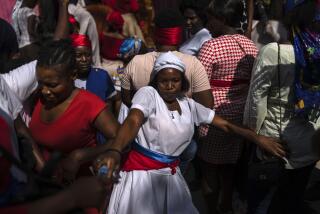Faith That Braves Despair
- Share via
Camille Ntoto has seen too much to be this placid, this affable. Or so it would seem. True, he and his wife, Esther, are living in a spacious house in the proverbial lap of Orange County luxury and have every outward reason to be content. But they also are missionaries in sub-Saharan Africa, and that’s got to do something to you.
And it has. As we sit in the late afternoon at his Irvine home, the 33-year-old Ntoto reflects on the delicate emotional dance of saving souls while listening to your fellow countrymen bear daily witness to poverty and despair.
Ntoto’s country is the Democratic Republic of the Congo, the former Zaire. It lies in that belt of central African nations racked with political instability or economic chaos, or both. He tells a story of one village where family members await their turns to eat -- the father eats on Monday, the mother on Tuesday, and so on.
That, of course, bears no resemblance to Camille and Esther’s life in Irvine, where they reside in a home provided by a benefactor. “To explain to them [in Africa] the type of life we live in Orange County, that’s alien to them,” he says. Describing freeway hassles or getting to work on time as big problems leaves his African listeners wondering if they’re living on the same planet.
I wanted to talk to Ntoto about the Live 8 concert last weekend and get his thoughts on its prospects for reducing poverty in Africa. Neither cynical nor skeptical about the intentions, Ntoto knows that celebrity voices can rally people to causes. But he wonders, without a hint of rancor, why worldwide reaction to the Asian tsunami disaster six months ago far outpaced people’s concerns about ongoing warfare and poverty in Africa.
In Ntoto’s world of ministering to troubled souls, there always exists the strange paradox of people who, in the midst of seemingly endless anguish, don’t give in. He says he sees people who, by any logical measure, should feel utterly hopeless. Yet they continue to envision a better day, demonstrating it in such prosaic ways as rebuilding houses and sending their children to school.
I ask about the stress that I know must gurgle within him. “At some point,” he concedes, “we have to protect ourselves emotionally. Thinking of it too much and being totally immersed with some of the very painful testimony we hear can actually stop us from functioning normally. But on the other hand, I believe we can be part of the solution.”
Camille and Esther work for a nonprofit group that wants to bring wider awareness to sub-Saharan Africa’s situation, coupled with healthcare programs and community development. Money helps, Ntoto says, but just as important are political stability and a sense in local communities that a better day beckons.
The Ntotos left the Congo in 1998 but always knew their work would take them back home. “Life for us would not make sense if we just shielded our minds to the atrocities and difficulties our people endure,” Ntoto says. The next round of work in Africa will resume in September and last several months.
This is not work for the timid. Their friends and relatives wonder why they’d go back to a situation fraught with risk. Why they’d want to return to a country where, Ntoto says, nearly 4 million people have died in ethnic warfare in recent years.
The answer, of course, is their faith. And their belief that they’ve been called to the dance.
As Ntoto explains this in the most genial of tones, I ask if he sleeps at night. For the first time in the hour, he pauses and sighs a couple of times while answering. “That’s a good question,” he says, before proceeding slowly.
“I still have memories from my last visits. I still sometimes have articles that come back to my mind. I still hear the voice of people who shared their experiences. I still get overwhelmed by what needs to be done. But I think what really helps me at this point is I know there is a divine being who cares more than I do, and my faith is a great help in this situation.”
Dana Parsons’ column appears Wednesdays, Fridays and Sundays. He can be reached at (714) 966-7821 or at dana.parsons@latimes.com. An archive of his recent columns is at www.latimes.com/parsons.
More to Read
The biggest entertainment stories
Get our big stories about Hollywood, film, television, music, arts, culture and more right in your inbox as soon as they publish.
You may occasionally receive promotional content from the Los Angeles Times.










